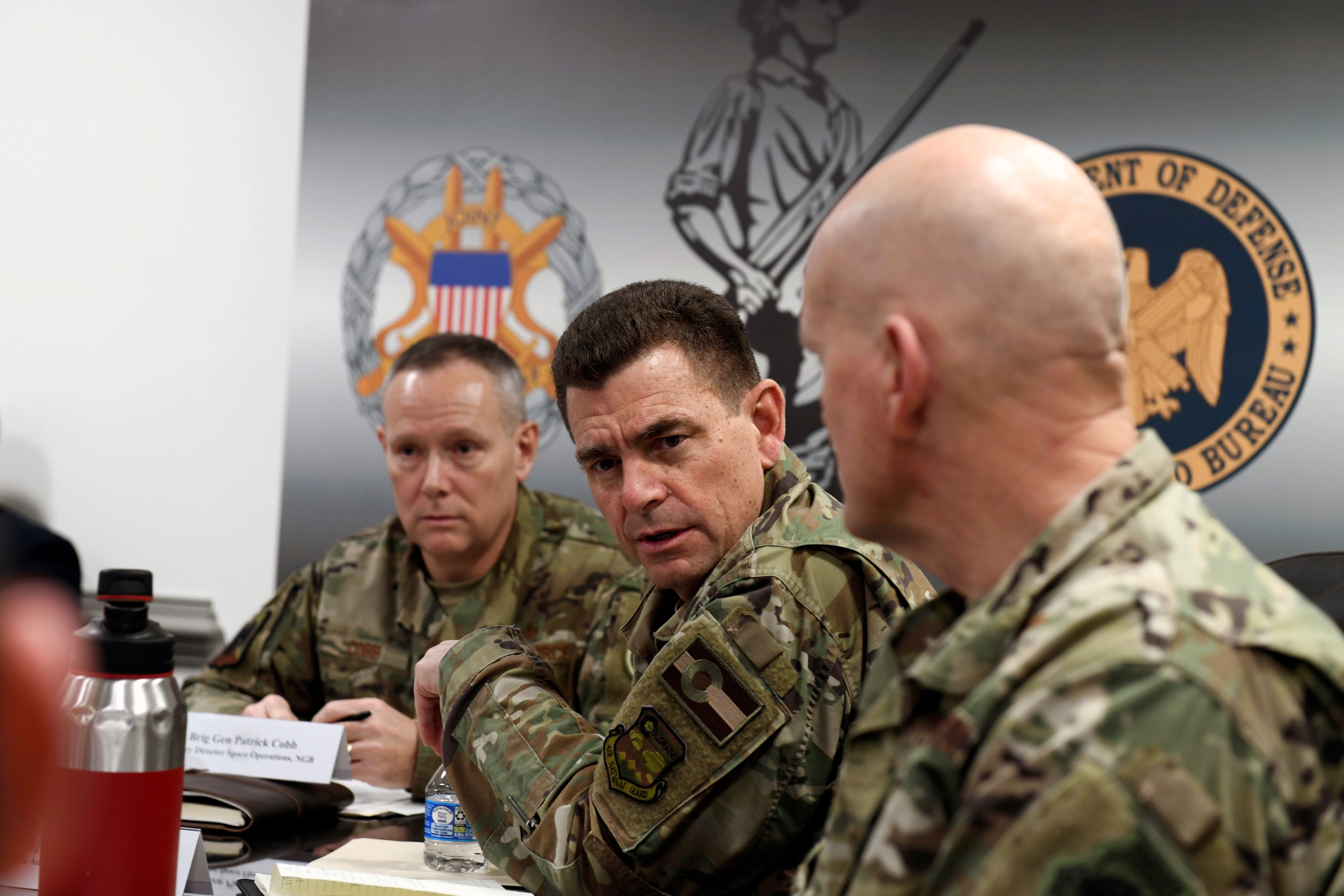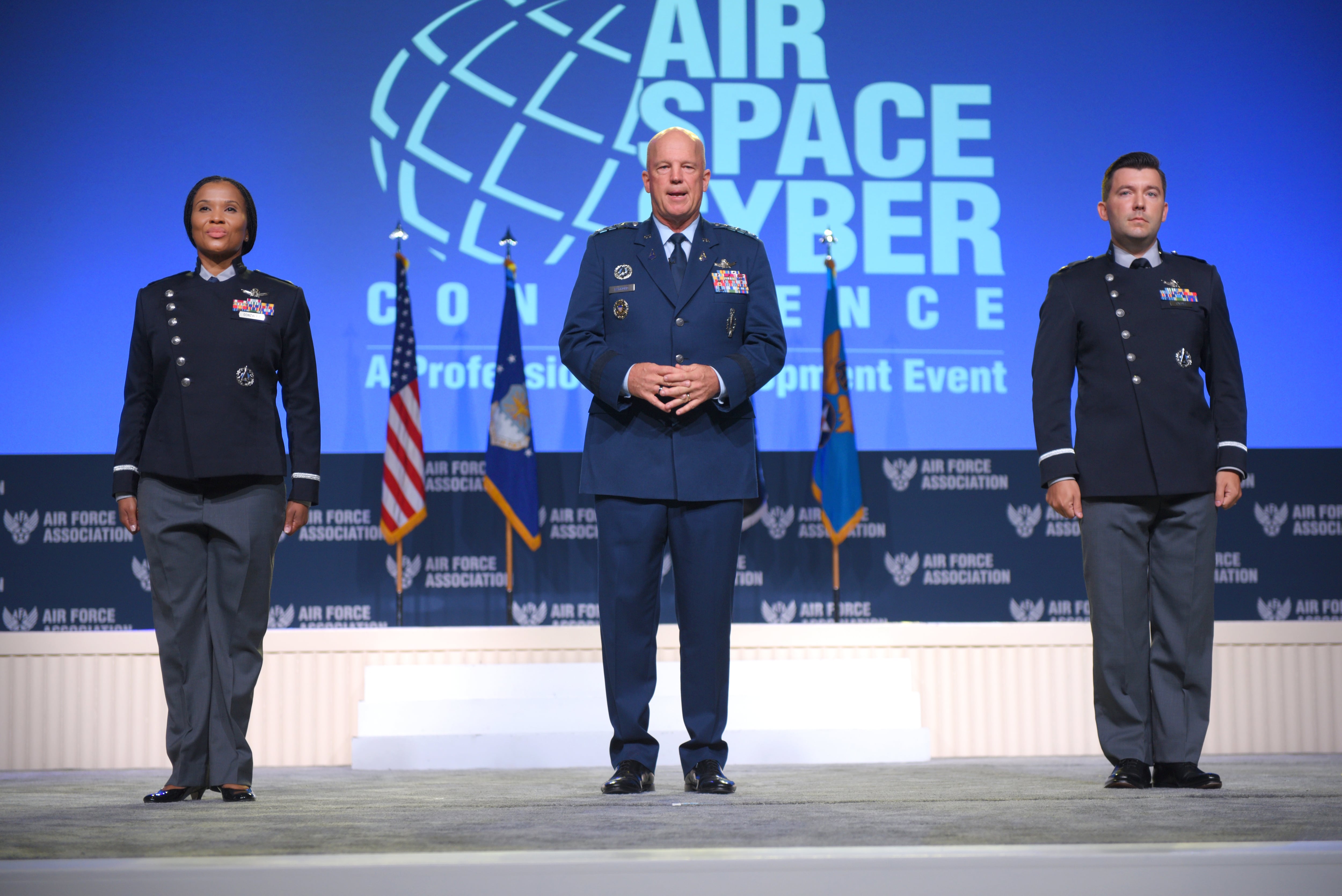NATIONAL HARBOR, Md.—The White House this week came out against the creation of a new Space National Guard, even as Space Force proponents inside Biden’s Pentagon continue trying to get the organization enshrined into law.
In a statement released Tuesday supporting the House’s version of the annual defense policy bill, currently under debate in the full chamber, the Office of Management and Budget “strongly opposed” the notion that a Space National Guard would strengthen the U.S. military.
“When the Space Force was established, Congress and the [Trump] administration alike emphasized the need to minimize administrative expenses and prioritize the development of space capabilities,” OMB wrote in its six-page memo. “This administration remains committed to that approach.”
RELATED

Rather than deliver new military space capabilities, OMB says the proposal would grow government bureaucracy and cost as much as $500 million a year. That price tag rounds up from the nonpartisan Congressional Budget Office’s 2020 estimate that a Space National Guard of 4,900 to 5,800 personnel could cost anywhere from $100 million to $490 million a year, and $20 million to $900 million in one-time construction and equipment costs.
CBO also found that a smaller Space National Guard comprised of about 1,500 people from current Army and Air Force National Guard units would cost about $100 million each year, plus one-time construction costs of about $20 million. The projection was based on a February 2020 proposal by senior National Guard officials.
Still, the White House’s budget office pushed back.
“The Air National Guard and Air Force Reserve units with space missions have effectively performed their roles with no adverse effect on DOD’s space mission since the establishment of the Space Force,” OMB wrote. “The administration looks forward to working with the Congress on alternative Space Force concepts that are efficient, effective and appropriate for space missions.”
The move surprised Air National Guard boss Lt. Gen. Michael Loh, the former Colorado adjutant general and a vocal supporter of the Space Force’s proposal.
Talks on creating a space Guard were going well until he learned of OMB’s opposition, he told reporters Wednesday at the annual Air Force Association conference here.
RELATED

The Department of the Air Force has pushed for a flexible, two-part service: the Space Force, encompassing a single pool of active-duty personnel and part-time reservists; and the Space National Guard to handle state and certain overseas missions.
Fourteen Air National Guard units handle space missions right now, including airmen in Alaska, California, Colorado, Florida, Hawaii, New York, Ohio and Guam. Guardsmen operate ballistic missile warning and nuclear detection systems, help track wildfires from above, wage offensive electronic warfare, and fly communications satellites, among other space-related missions.
But they’re homeless within the air service now: “They’re in [specialties] that no longer exist in the Air Force,” Loh said. “[The Space Force is] an active component-only service right now.”
Delays in creating a Space National Guard have led to gaps, including less-robust training, Loh said. He argues that the way to avoid a larger pile of red tape is — paradoxically — to create more bureaucracy.
A separate Guard organization would allow the Space Force to handle its own personnel and equipment needs more efficiently, he said. If lawmakers opt to keep those troops within the Air National Guard, officials must translate Space Force requirements into Air Force requirements and try to get them funded through Air Force Materiel Command in order to get guardians what they need.
Those complications are already playing out as Air National Guard members are operating space systems on deployments overseas, Loh noted.
OMB’s announcement also puts President Joe Biden’s Democratic administration at odds with the Senate and House chambers controlled by his own party.
RELATED

As part of annual defense legislation, the Senate is considering a proposal to change the name of the Air National Guard to the Air and Space National Guard, while the House will vote on whether to create a separate space Guard altogether. If both pass, lawmakers from both chambers must then find a compromise between the different plans.
“The committee believes this is the most efficient use of scarce funding based on the number of personnel performing space missions in the existing Air National Guard and the size of the Space Force,” the Senate Armed Services Committee argued in a report accompanying its version of the fiscal 2022 defense policy bill.
Senators also want the defense secretary to send lawmakers a plan to make that change and any needed legislation no later than 180 days after the must-pass bill becomes law.
In the meantime, Loh will continue making his pitch for a Space Guard and the efficiencies it may bring.
“I am awaiting somebody else’s decision,” Loh said. “We’ll see what happens as those three groups get together and decide the fate of a Space National Guard.”
Rachel Cohen is the editor of Air Force Times. She joined the publication as its senior reporter in March 2021. Her work has appeared in the Washington Post, the Frederick News-Post (Md.), Air and Space Forces Magazine, Inside Defense, Inside Health Policy and elsewhere.





